Three-Day International Conference on “Good Governance in a Globalising World”
November 18-20, 2011
Kolkata, West Bengal
Organised by
Institute of Objective Studies
&
IOS Kolkata Chapter
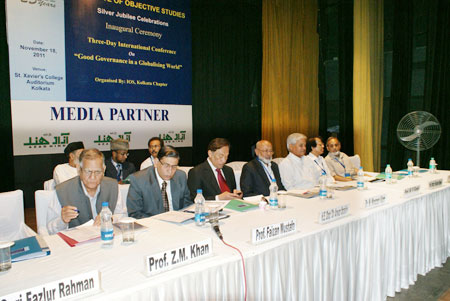
L-R: Prof. ZM Khan, Secretary General, IOS; Prof. (Dr.) Faizan Mustafa, Vice Chancellor, National Law University, Bhubaneswar; H. E. Dato Dr Anwar Ibrahim, Former Deputy Prime Minister of Malaysia; Dr Mohammad Manzoor Alam, Chairman IOS; Prof. MP Singh, Vice Chancellor National University of Juridical Sciences, Salt Lake, Kolkata; Prof. (Dr.) Imtiaz Ghulam Ahmed, Faculty of Law, Calcutta University; Dr. Abdur Rahim Khan, Ex Principal Bangabashi College, Kolkata
3-DAY IOS INTERNATIONAL CONFERENCE IN KOLKATA ON GOOD GOVERNANCE
Malaysia’s former deputy PM Anwar Ibrahim raises issues of justice, fair play, pluralism, rule of law and good governance as other eminent intellectuals analyse and grapple with core issues.
Kolkata, Nov. 18: A thrice-day international conference on “Good Governance in a Globalising World” began here today at the St. Xavier’s College with the recital of verses from the holy Quran by Abdul Basit Ismail, who later conducted the proceedings.
Prof. Imtiaz Ghulam Ahmad of the faculty of law, Calcutta University, welcomed the participants. He said while the country had progressed economically, the fruits had not reached the weaker people. Questions like “Is growth inclusive?”, “Development for whom?”, “Whom does globalisation help?” had to be asked. The answers to those questions were the basis of good governance.
Javed Abbas Siddiqui, a research scholar at the IOS Kolkata Chapter, presented an introduction of the IOS and its Kolkata Chapter.
Prof. Z.M. Khan, the General Secretary of IOS, in his “A Few Words About the Theme” said it was selected for the Kolkata conference keeping in view “Kokkata’s intellectual tradition, Kolkata people’s competence for dealing with such a subject and their commitment to a better governed West Bengal and India.”
He referred to Ali Mazrui’s view of globalisation as homogenisation and, ultimately, hegemonisation, that was going to be bad for the weak in crucial ways. Mere profits would not sustain an equitable social order. “Moral commitment would be sorely needed to establish a more fair order.”
Prof. Khan asked “Would religion be of any help? Would Islam, with its strong emphasis on fair play, help us out of a situation where people responsible for creating the global economic crisis of 2008-2009 are rewarded with ‘bonuses’ running into millions of dollars?” He said these questions had to be considered seriously.
Prof. MP Singh, Vice-Chancellor of National University of Juridical Sciences, Kolkata, said in his inaugural address that “good” had always been implied in governance, traditionally. The “good governance” catch phrase was coined not long ago by the World Bank, which insisted on good governance for countries asking for World Bank loans. He said that what constituted “good” for the World Bank might not be really good for the countries in question as the World Bank’s own interests were more important in the reckoning than anything else.
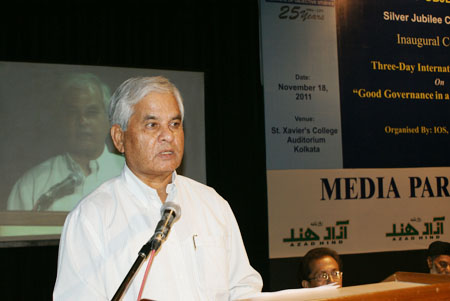
Speaker: Prof. MP Singh, Vice Chancellor National University of Juridical Sciences, Salt Lake, Kolkata
Otherwise, he said, it involved accountability, constitutionalism, rule of law. In a state marked by good governance things were not judged by a court of law alone, but also by the people, who judged and corrected the government outside the court system.
The state was obliged under the Constitution to protect the rights of people who were not capable of doing it on their own. Citizens, collectively and individually, too, were obliged to act in ways that led to the protection of people’s rights, especially of the weaker groups like Dalits and minorities.
He observed that universal adult franchise had empowered people, steered the country away from its feudal roots, towards greater participation, and worked as a force for good governance, despite failings of the system in significant ways.
In his keynote address, Prof. Faizan Mustafa, Vice-Chancellor of the National Law University, Bhubneswar, talked about the retreating state and advancing markets. “It’s no longer the Keynesian welfare state, but a state that is gradually making way” for rule by business corporates.
Rule of law today meant rule of laws that were not made in countries where they were applied, but laws made in European Union and the United States. It was rule of law at adverse play, the new normal. That implied developing-world states run under World Bank-IMF fiat, and by multinational companies and hedge fund firms. The idea of state had been decoupled from the idea of law, a decoupling that had frightening implications for the weak.
Syed Ali, a veteran journalist and one of the guests of honour, observed that the world was in transition. “Marxism is dead, capitalism is dying, and Islam is on the ascendant,” he asserted.
Dr Anwar Ibrahim, former deputy prime minister of Malaysia and chief guest at the conference, said in multi-racial, multi-lingual countries like India and Malaysia “Constitutions could be prostituted” and subverted by entrenched interests. “Knowing, respecting and celebrating the diversity of intellectual and cultural traditions”, he said, was more important than squabbling over religious differences.
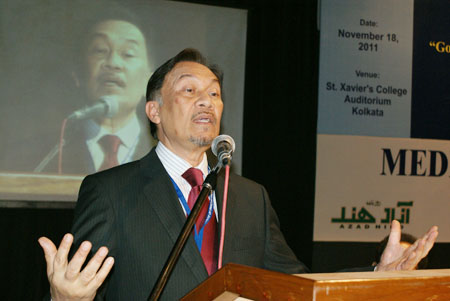
Speaker: Dr Anwar Ibrahim, former deputy prime minister of Malaysia
Dr Ibrahim said that the two most significant trends of today were the Arab Spring that represented freedom from tyrannical rule, and Occupy Wall Street that signified rejection of an unjust economic order. Quoting Amartya Sen he said, “Justice must prevail.”
Emphasising the role of awareness and enlightenment in the creation and sustaining of an open, just order, he remarked, “A democracy is not functional if it does not have education.”
He noted that the ideals of a good society anywhere were identical, including in Islam. “Peace and tolerance are part of Maqasid-e-Shariah (ideals of Islamic law), which holds that we are either ‘brothers in Islam’ or ‘brothers in humanity’.” Governance had thus to be morally justifiable, consistent and coherent.
Elaborating on the quality of India’s governance, he said so much of deprivation did violence to the image and stature of stalwarts like Nehru and Gandhi. On the international scene, he said, Wall Street had been making private profit at the cost of the public. The private profiteers had been bailed out with public money.
Citing the story of the film Titanic, he said that as the ship was sinking, the hero De Caprio was allowed to drown and the heroine Kate Winslet was saved. “For bad governance, the rich are rewarded and the poor punished. The poor and weak are allowed to perish and the rich and strong are saved.”
He cited the case of Malaysia that was particularly in the need of good governance. Rampant denial of civil liberties and persecution of opposition leaders marked political life in Malaysia, where senior political leaders were regularly tortured in prisons.
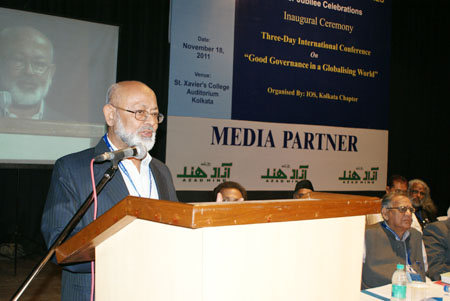
Speaker: Dr Mohammad Manzoor Alam, Chairman IOS
In his presidential address, IOS Chairman Dr Mohammad Manzoor Alam, said that repeated pleas for better representation of Muslims in legislature, jobs and policy-making positions had failed. He said a better-organised and joint effort by different groups would be more successful.
A vote of thanks was proposed by Dr Abdur Rahim Khan, ex-principal of Bangabashi College.
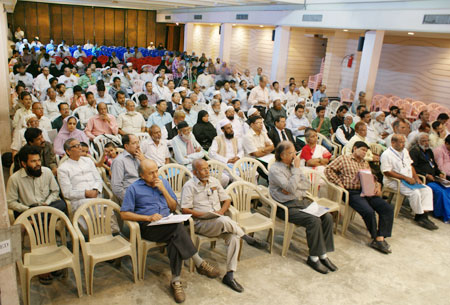
A view of audience
Day-II
Business Session-I
The first business session of the second day was chaired by Prof. Imtiaz Ghulam Ahmad, former dean faculty of law, Calcutta University and the theme was “Good Governance and Ethics.” The “special address” was by Dr Anwar Ibrahim.
Dr Ibrahim observed that good governance came from, among other things, strengthening of institutions like a free judiciary and free media, which were not controlled by big cartels. It also came from what Alexis Tocqueville called “habits of the heart.”
People must get involved in the project of creating and sustaining good governance and jettison the “ruler knows best” mindset. On their own, “stock exchange and media mean little as they are manipulated by powerful people in their narrow interests.”
A moral perspective on issues of governance was imperative. Citing the case of an early Muslim ruler, Omar bin Abdul Aziz, he said that rulers appointed people to watch over the ruled, but Omar appointed someone and told him, “I appoint you to watch over me. If I am wrong, stop me.”
Justice Shyamal Kumar Sen, former Chief Justice of Calcutta High Court, former head of West Bengal Minority Commission, and Acting Governor of West Begnal for sometime, lauded the IOS for its efforts. He said a constant striving for improvement in quality of governance was an imperative.
“Globalisation has brought the world together physically, but has often separated us in our hearts,” he observed. Conflicts had thus arisen that were not solved peacefully, but with wars. Ethical values were sorely needed.
“There is a strong contest going on between the animal and the rational within us. The most powerful country has devastated Iraq, instead of peacefully resolving the issues on the basis of reciprocity, give and take,” he said. Civilisations did not progress without respect for the other, tolerance of difference and the right to dissent.
He advocated value-based education for society to be able to curb corruption, “which is taking out the soul of the country.”
Prof. Miratun Nahar, former head of department of philosophy, Victoria Institution, brought a feminist perspective to the discourse by stating that the first Muslim after the Prophet (PBUH) was a woman. She pleaded for greater attention to women and other weaker groups for governance to be meaningful.
Dr Arshi Khan of the deptt. of political science, AMU, observed that good governance went by many names like, “responsive governance, “democratic governance,” “fair administration.”
Under such a dispensation, the state was there for the wellbeing of people and political activism was encouraged. There was a sound pattern of relationships between the state and the people.
“In this scheme of things, political morality has a vital role as the state legitimises itself through the political community. It is the opposite of what we are seeing today in India, where the innocents of one community take nine years to get bail (despite their innocence), while the known offenders from another community take nine years for charges against them to be framed,” Dr Khan said.
He said that India being a federal, multicultural state such discrepancies were unacceptable. “Moral requirements of the society have to be taken into cognizance,” Dr Khan concluded.
Dr. Sanjiv Mukherjee, associate professor, department of political science, Calcutta University, opined that in good governance a strong emphasis was placed on justice. Also, the old maxim that “a good government governs the least” held true.
Such a government would not tread on the rights of people. Advanced societies, he said, relied more on “non-governmental” institutions like family, religion and the market than on government.
Expansion of government’s role in the lives of citizenry promoted corruption. This situation was against the liberal ideal of limited government.
Elaborating on the point he said that competition with socialism brought the welfare state in Europe, which expanded the area of government function. That ultimately led to misuse of power and official corruption.
Naturally, a time came when the backlash began. Margret Thatcher re-emphasised market and minimal government. The state had to provide only the infrastructure and services, strengthen civil society, NGOs and others.
Dr Mukherjee, however, added that amidst all this the ideas of justice, fair play and people’s participation were not addressed. Justice had to be the “primary agenda.” This required good governance.
Referring to an article by Amartya Sen and Jeane Derez, he said right to adequate livelihood and right to assistance were “fundamental to growth.”
Citing inadequacies in implementation of crucial constitutional provisions for people’s empowerment, he said the right to free and compulsory education enshrined in the Constitution could be realised last year, after six decades of the promulgation of Constitution.
Making an intervention, Dr Mohammad Manzoor Alam pointed at an anomaly in the Right to Education Act that made education compulsory for every child. It precluded children going to madrasahs, a fact that had been represented before the Union government by several Muslim organisations. He also mentioned that papers presented at various seminars and conferences under the IOS Silver Jubilee programme would later be published by IOS in a series of books. For that he asked participants to submit a more well-rounded and thoroughly revised version of their papers.
Prof. Imtiaz Ghulam Ahmad summarised the proceedings in his presidential remarks. To conclude, he said, “government without a moral basis is disasterous.”
Business Session-II
The second business session, chaired by Dr Miratun Nahar, had “Governance and Development” as its theme.
M C Raj, co-ordinator, campaign for Electoral Reform in India, Karnataka, presented a well-researched paper on proportional representation and electoral reform in collaboration with Dr C S Dwarkanath.
Business Session-III
The theme of this session, chaired by Prof. Miratun Nahar, was “Globalisation and Its Impediments.”
Speaking on the issues, Dr Abdur Rahim Khan traced the current world order back from the days of fall of the Soviet Union and the emergence of a single Super Power to dominate the world.
Dr Hilal Ahmad Wani of AMU said India was in transition and, thus, rocked by too many uncertainties. He talked about violence in Jammu and Kashmir by security forces. Rather on an off-key note, he quoted a couplet by Iqbal that says “In democracy heads are only counted, not weighed.”
Dr S K Abdul Kalam, associate professor, Bijoy Narayan Maha Vidyalaya, Hooghly, in his finely-researched paper said the West Bengal minorities had been systematically kept out of the loop of power over the decades.
“Areas in West Begnal where Muslims live have no infrastructure. Only 13 percent of these locations fall within urban areas against 35 percent Muslims at all India level.” In another intervention, Dr Mohammad Manzoor Alam corrected Dr Wani, saying that Iqbal’s take on democracy was no longer relevant in today’s context.
Business Session-IV
This session, chaired by Prof. S R Mondal, had “Governance and Social Justice” as its theme.
After an elaborate introduction of the theme by the erudite Prof. Mondal, Dr Tanweer Fazal, Reader Nelson Mandela Centre for Peace and Conflict Studies, Jamia Millia Islamia, New Delhi, presented his thought-provoking paper on the Muslim situation five years after the Sachar Report.
He referred to the term “governmentality” coined by Michel Foucault to make his point. Through governmentality the rulers sought the support of the ruled.
Five years down the line from the Sachar Report (for which Dr Fazal had worked as a researcher), the Union government, instead of keeping the focus on “minority rights”, had shifted it to “minorityism, which was somehow antithetical to minority rights.
“The state, instead of deepening equity and equality, has shifted the focus to minority cultural markers and tokens of identity,” he said. It did not address the real issues.
Dr Fazal said that Sachar was a departure from the past practices in that it did not focus on identity, but equity through education and political and economic participation.
The report talked about work participation and other indicators of human development. It had an area-specific approach rather than the usual district-level perspective, which powerful politicians had been using to benefit their own constituencies.
The Sachar Report talked about socio-religious categories and a national data centre, not just for the minorities, but for everyone. It also proposed an Equal Opportunity Commission. Little progress had been made on any of these issues.
Sachar proposed an institution not for grievance redressal, but for research and data.
“Muslims suffer from educational deprivation,” he said, adding that unnecessary confusion was sought to be created over madrasah education, though madrasahs had only four percent of all Muslims enrolled in educational institutions.
“Demand for schools in Muslim localities is high, but schools are not built in such areas. In a majoritarian context, minority identity does get accentuated, but the issues of justice and minority rights are prominent,” he observed. In post-Sachar years little progress had been made in resolving the aforementioned issues, Dr Fazal concluded.
Dr Zafar Mahfooz Nomani, associate professor, deptt. of law, AMU, made a cogent presentation on environmental governance and eco-protection in a globalising world.
His paper cut a wide swath of human economic activity in a globalising world –transnational business, market, government – that had a direct bearing on environment and climate change. There were many players in the scenario – communities, societies, NGOs and states.
He talked about proceeding ahead with preservation of bio-diversity and referred to the Bruntland Report and its insistence on sustainable development. He also traced the history of the environment protection movement and the seminal work of Rachel Carlson, “The Silent Spring,” that started serious thinking on environmental issues.
He discussed the preservation of indigenous knowledge and protection of indigenous peoples. He said colonial law-making took ecology as an economic issue. “Environmental governance demands a multi-sectoral approach where the state is only one factor. The state tends to become a usurper in a marketised, globalised world.”
He said quite often market-driven globalisation was at odds with the imperatives of environmental governance. Ideas and practices like corporate social responsibility, carbon taxing and the omnibus idea of environmental governance were there that would ease things.
The ideological vacuum had to be filled by ensuring the observance of human rights and humane governance that would be participatory, responsive, equitous and inclusive. He referred to the books “Silent Spring” and “Small is Beautiful” to make the point that environmental governance was the opposite of grab and run government.
He discussed a network of laws, agreements, protocols, conventions, institutions and approaches to environmental governance.
Dr Alfiya Tundawala made a brilliant on how the Narender Modi government had failed on all counts of good governance. Her paper mainly focused on the “themes and images” created by five “community newspapers” during the Gujarat Anti-Muslim pogrom of 2002.
She said the state’s function was to regulate the public domain. “There is no agreement on the definition of ‘good governance’, which is an umbrella concept”, she averred. The generally agreed upon ideas regarding it were that government assisted and provided equal opportunity and equal protection of law to citizens, made legitimate use of power, was marked by transparency, accountability, human rights and protection to the weak.
The Modi government failed on all these counts, which Dr Tundawala described as “failure of the modern liberal state.” The idea of justice and good governance got a beating as no criminal was identified, much less punished, by the government. The unkindest cut of them all was that the people who perpetrated the carnage were voted back to power.
She presented an analysis of five “community newspapers” of that period, looking at the themes they addressed, the images they created. “Government created and sustained inter-community friction and sustained it for the sake of power.”
She talked about the inherent violence of the Indian state and the dominant narrative of the days of the Gujarat pogrom that described the violence as “unfortunate”, rather than “unjust.” She hinted at the deliberate distortion saying “misfortune and injustice are different”, the former being outside human control, the latter a creation of humans. Gujarat violence was unjust, not unfortunate as portrayed by the perpetrators and their fellow travellers who were part of a conspiracy of silence. She said, the newspapers analysed by her presented, in stages, images of Muslim pain, followed by despair and, finally, hope. She said, in Gujarat, “constitutional governance achieved nothing but normalised violence.” She concluded by saying that the political arithmetic of power had to be reconciled with the moral arithmetic of justice.
Business Session-V
This session, chaired by Prof. S R Mondal, had “Good Governance in the 21st Century” as its theme.
After an erudite introduction of the theme by Prof. Mondal, Dr Syed Mohibul Haque, associate professor, deptt. of political science, AMU, presented a brilliant critique of globalisation and its darker side.
Quoting Gramschi, he said globalisation was universalisation of capitalism and its evils. The concern of globalisation and its main goal was the same as that of capitalism: maximisation of profit. This had to be seen from the perspective of social contract for distribution of scarce resources to understand what globalisation really meant.
Another perspective on it could be that of justice. That it had hurt the cause of socio-economic justice was widely evident today.
The fundamentals of human rights like socio-economic justice and right to life had been sidelined as the corporate onslaught had been moving apace. “The state is withdrawing from the social sector and has become a negotiator on behalf of the corporate. It is not a question of good governance, but mere governance,” Dr Haque observed.
Dr Haque condemned it as a curse on the weak and the poor, an “anti-deprived” force in cahoots with the educated elite. The new development paradigm was threatening the existence of tribes. In SEZs there was no gender equality as there was a difference in the payment for the same work between men (higher) and women (lower).
The social Darwinism was being promoted by the “smart operations of the state with the help of misleading data.” Such a state lauded the education provided to the children of the elite by schools which charged Rs. 25,000 a month per child in a country where 75 percent people were hopelessly poor.
Dr Mohammad Manzoor Alam said the situation of Muslims was dismal. The Minority Affairs Ministry was not able to use more than 40 percent of its funds for the community’s uplift.
He mentioned one of his meetings with the West Bengal Chief Minister, Ms. Mamata Bannerji. He told her that 96 percent of the Muslim children getting education were going to schools and only four percent were going to madrasahs. Yet governments were blaming lack of education among Muslims on madrasahs. He also asked her why there were no girls’ hostels in Muslim localities. Referring to Dr Fazal’s observations, he said “minorityism” was a problematic word with unpleasant associations. He also wondered why there was so much of hesitation over the creation of an Equal Opportunity Commission that would not be for Muslims alone, but for all communities.
Day-III
Business Session-VI
This session, chaired by Prof. SJR Bilgrami, former head, deptt. of political science, Jamia Millia Islamia, had “Islamic View of Good Governance” as its theme.
Dr Zafeer Ahmed, head deptt. of chemistry N D College, Howrah, dwelt in detail upon the principles and practices of Islamic governance.
Veteran Urdu journalist Syed Ali elaborated upon justice and equality under Islamic dispensation.
Syed Tahseen Raza of deptt. of political science, AMU, saw India’s development as unequal, “but not hopeless, as others are more unequal”.
Prof. Mohammad Momin of Burdawan University was of the view that India’s development was lopsided. He said good governance was an impossible goal, but an Islamic variant would be closer to it. He wove a complex web of ideas into his argument for what he thought would be good governance. These ideas were derived from disparate Western and Islamic sources.
The Valedictory Session
This session was chaired by Prof. Z M Khan, and the valedictory address was delivered by Porf. SJR Bilgrami.
In his address Prof. Bilgrami talked of three intersecting circles, namely: Globalisation, Governance, Arrangements to deal with the resulting situation.
Globalisation, he said, was a fact, but there was a lot of euphoria and wistful thinking around it. Euphoria led to denial of facts on the ground.
“Globalisation is not unique in history. We are asked to obey the diktat of globalisation, which is driven mainly by the US, the EU and Japan. Others are left out.”
He said, the cultural homogenisation, which was part of globalisation, threatened the cultures of the dominated. Questions like exclusion by what, whom and since when were pertinent. The excluded looked at globalisation differently from the included. Another question was would globalisation include the excluded?
Regarding the second circle, governance, he observed that the experience of 192 countries showed that globalisation was “without government, without authority.” International law was not binding on countries that were not signatories to it, and globalisation often related to international law.
Prof. Bilgrami said that the Quran was revealed at a time when the world was knit together by civilisations. “The Quran thus provides the perspective for a scenario like today’s. A cultural and systemic structure is needed to sustain the ideals of the Quran.”
Coming down to the third circle, arrangements to deal with the resultant scenario, he said the 1893 Parliament of World Religions in Chicago adopted a resolution on global ethics. It was later formalised.
The heads of state submitted to the UN a draft on “human responsibilities” to sustain human rights.
In 1948, Gandhiji said “the Ganges of rights originate from the Himalayas of responsibilities. Fourteen centuries ago, Imam Zain-al-Abideen said, “we must be responsible for our behaviour.”
Being responsible was a key point in how to deal with globalisation.
“Don’t wait for globalisation to unite you. Globalisation itself is the victim of the exclusion-inclusion division,” Prof. Bilgrami advised Muslims.
Islam provided a perspective on human unity as it saw “all creation as God’s family” and stood for the brotherhood and sisterhood of humans, he concluded.
In his presidential remarks Prof. Z M Khan summed up the three day’s proceedings with remarks on the quality of participation.
A vote of thanks was proposed by Nesar Waris.
The following resolutions were passed at the end of the conference:
1. There should be a serious effort to set up a specialised IOS Centre on Media and Regional Studies in West Bengal.
2. The Kolkata Chapter of IOS may draw a plan to approach regional institutions to muster support for increasing interaction with marginalised groups to study their problems within a specific context.
3. Efforts should be made to involve the political, social and cultural segments of West Bengal for creating awareness about the plight of Muslims and other marginalised sections in the state.
4. An interfaith dialogue programme is already underway, sponsored by the IOS, which may be taken up by the Kolkata Chapter for West Bengal. It is proposed that the publication of a journal on interfaith dialogue may be taken up.
5. The Kolkata Chapter may plan to work on specific research projects, surveys and survey studies on the regional level of West Bengal, like Panchayati Raj and welfare of Muslims.
6. The IOS Kolkata Chapter may initiate a special drive for reforms in the electoral system in India.
7. The Kolkata Chapter of IOS may launch programmes specially designed for women and youth welfare and for creating awareness.
Go Back